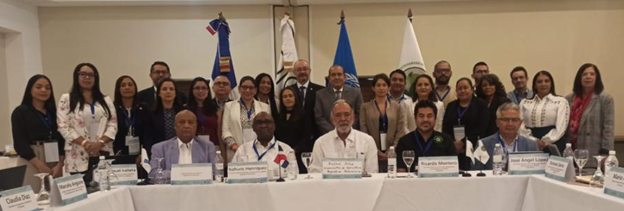OCTAVA REUNIÓN DE PERSONAS EXPERTAS DE LA COMUNIDAD DE PRÁCTICA SOBRE SEGUROS AGROPECUARIOS EN CENTROAMÉRICA Y LA REPÚBLICA DOMINICANA
Work area(s)
The 8th Meeting of Experts of the Community of Practice on Agricultural Insurance in Central America and the Dominican Republic took place in Santo Domingo, Dominican Republic on September 28th and 29th of 2023 and was organized and developed by the Economic Commission of Latin America and the Caribbean (ECLAC) in coordination with the Executive Secretary of the Central American Council (SECAC) with the support of General Director´s Office of Agricultural Risk of the Ministry of Agriculture of the Dominican Republic. The meeting was carried out in person with virtual means during the two days scheduled for the event.

The meeting featured the participation of technical officials of the Ministries of Agriculture of Central American countries and the Dominican Republic, the member countries of the Central American Agricultural Council (CAC), public and private institutions related to agricultural insurance, international organizations working in topics related to the insurance and reinsurance industries, the Food and Agricultural Organization of the UN as well as ECLAC, among others.
The Subregional Headquarters of ECLAC in Mexico and SECAC have been pushing an initiative since 2013 for the development and strengthening of agricultural insurance from a comprehensive risk management perspective and other comprehensive services targeted toward micro and small agricultural producers.
Agricultural insurance is designed as a last resort instrument of risk transfer, after actions to reduce vulnerabilities are exhausted, and to effectively respond to emergencies due to climate change the Eighth Meeting of Community of Practice on Agricultural Insurance was held to assess the evolution of said instruments of risk transfer in relation to climatic risks and its impact on production and productivity of micro and small agricultural producers as well as risks associated to the personal health of producers in rural areas and risks related to the commercialization and distribution of agricultural goods. The results of a study by SECAC on collected good practices and feasibility of implementation of agricultural insurance in the region was also presented.
The meeting was inaugurated by the Vice Minister of Scientific Affairs and Technology of the Ministry of Agriculture of the Dominican Republic Mr. Rafael Ortiz; the Regional Technical Coordinator of SECAC Mr. Ricardo Montero; representative from the Superintendent of Insurance Mr. Domingo Batista; and the Head of the Agricultural Development and Climate Change Unit of the subregional headquarters of ECLAC in Mexico Ms. Julie Lennox.
The interventions highlighted the importance of taking into account a parametric agricultural insurance product that brings protection to small producers in view of the fact that the Caribbean nations receive least one cyclone every year.
It also emphasizes the importance of having a regional proposal with the re-insurers, making corresponding legal modifications and that the relevant parties move forward to turn it into a public good. It was also pointed out that many of the phenomena that affect these countries come from anthropogenic intervention and environmental degradation, which in turn affects ecosystem services.
The event was held with in person participation as well as virtually with 44 participants, of which 23 were women, equivalent to 52%, and 21 were men, which represented 48%. The national technical officials and from international organizations presented keynote presentations on the diagnostics of agricultural insurance, with emphasis on parametric and catastrophe types, gave exposition on the state-of-the-art advances, and provided input for the definition of potential areas of bilateral and multilateral cooperation in the framework workplan between ECLAC and SECAC.
The event ended the second day by re-iterating the importance of implementing measures of climate change adaptation that facilitate the operation of parametric insurance incorporating field visit schedules, as far as possible. In addition, it emphasized the importance of including other actors such as the superintendents responsible for supervision of the insurance companies and the performance of the assurance products and opening up the dialogue on the ways in which reinsurance companies operate, including multilateral strategies for their contracting.
For more information, please see the report associated with this event. (Available only in Spanish)
Note: The acronyms used in this briefing note refer to each respective organization´s name originally in Spanish and have been translated into English.
Subregional headquarter(s) and office(s)
Country(ies)
- Central America
-
Dominican Republic